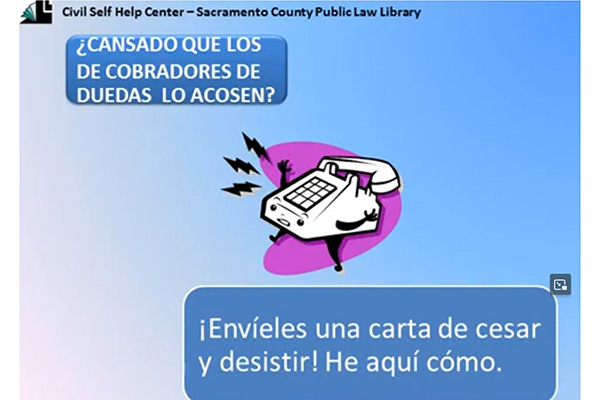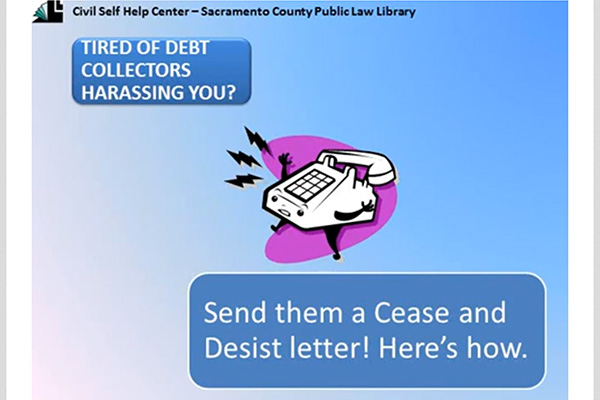Debt, Debt Collection, Repossessions, Garnishment Category: Courts and Procedure
Overview
An unpaid debt may lead to a collections lawsuit. Losing these lawsuits can lead to wage garnishment, bank levies, and liens on real property. A debtor can respond to the lawsuit in one of several ways. See our guide on “Responding to a Breach of Contract Lawsuit” for more information.
Forms
Homestead, Abandonment of
Homestead Declaration – Spouses as Declared Owners
Homestead Declaration
Exemption from the Enforcement of Judgments
This list includes the most common assets and income that may be exempt from levy upon a judgment. This means that state and federal laws prohibit judgment creditors from taking these types of property in order to satisfy their judgment. Exemptions are found in the United States Code (USC) and...
Read MoreCheck your credit report free now once per week
The credit reporting companies (Equifax, Experian, and Transunion) are required to provide a free credit check once a year. During COVID-19 pandemic, that changed to once per week. That law expired in December 2023, but the companies made the once-per-week option permanent. People working on their credit scores may need...
Read MoreAuto Repossession
What is Automobile Repossession? When you buy or lease a car on credit or get a loan, the person or business you owe the money to is called the “creditor.” Often, you will sign an agreement or contract giving the creditor the right to take back your automobile if you...
Read MoreCredit reports
What is a Credit Report? A credit report is a record of a person’s or company's past borrowing and repaying records. What Information is on my Credit Report? report summary; account name(s); credit bureau information; date account(s) opened; monthly payment(s); last reported date account(s) updated; account balance(s); account status; account...
Read MoreFair Debt Collection Act
Lee en español: Prácticas Justas de Cobranza The Federal Fair Debt Collection Practices Act (15 U.S.C. §§ 1692-1692p) and California’s Rosenthal Fair Debt Collection Practices Act (Civil Code §§ 1788 et seq.) protect consumers from abusive, unfair, or deceptive practices by debt collection agencies. These laws only apply to debt...
Read MoreAm I Judgment Proof?
What does it mean to be “judgment proof?” “Judgment proof” is not a legal term, although we often receive requests for a legal definition of the phrase at the Law Library. In layman’s terms, a person is judgment proof when they have no collectable income or assets. In this case,...
Read MoreTraffic Court
General information Failure to pay Failure to pay as agreed will result in your account becoming delinquent. Collection enforcement includes, but is not limited to, garnishment of your wages, seizure of funds in your bank account(s), placement of a lien on any real property you own, the balance of your...
Read MoreShould I Answer?
Responding to a Breach of Contract Lawsuit When a lawsuit is started against you, the Plaintiff will have you served with a Summons and Complaint. These documents formally notify you that a lawsuit has been initiated, and what the lawsuit is about. What are my options? You have three basic...
Read MoreSH@LL (Self Help @ the Law Library) (formerly Civil Self Help Center)
Accidents and Torts

SH@LL provides general information and basic assistance to people without attorneys on a variety of civil legal issues. All assistance is provided by telephone or Zoom videoconference. Visit “What We Help With” for a list of qualifying cases.
Eligibility: Must be a Sacramento County resident or have a qualifying case in the Sacramento County Superior Court.
Sacramento County Sheriff’s Department Civil Bureau
Courts and Procedure

The Sheriff’s Civil Bureau can serve civil process for documents such as summons and complaints, restraining orders, bench warrants, evictions and any other court documents. The Civil Bureau also handles wage garnishments, bank levies and seizure of judgment debtor assets.
Capital Pro Bono Debt Collection Defense Clinic
Money Debt and Consumer Issues

By appointment only.
Capital Pro Bono’s Debt Collection Defense Clinic can provide assistance with understanding and cleaning up credit reports, disputing debts and identity theft, and evaluating whether or not you should file for Chapter 7 bankruptcy or answer debt collection lawsuits.
Eligibility: Must be low income. Must have legal Immigration status
Community Legal Services Clinic (McGeorge)

Students at the McGeorge School of Law can serve low-income clients in the areas of Immigration, Bankruptcy, and Elder & Health Law.
Civil Self Help Services
Courts and Procedure

Civil Self-Help Services (SHS) helps people without lawyers who have questions about simple issues related to a civil case. They can give you general information and help you prepare your own forms in the area of civil law. Common topics include civil harassment restraining orders, petitions for change of name/gender, and expungement of criminal convictions.
Housing and Economic Rights Advocates (HERA)
Estates Wills and Trusts

Case consultations on housing, predatory and unfair lending, estate planning, foreclosure prevention, reentry, and credit.
Eligibility: low to moderate income
Responding to a Debt Collection Lawsuit (Answer-Contract)
When a lawsuit is started against you, you will be served with a Summons and Complaint. Ideally, these will be personally served (delivered to you in person). Service is valid even if you refuse to take them, as long as the server informs you that they are legal documents and...
Read MoreBank Levy
After you’ve won your lawsuit and received a judgment against the other party, your next step is to attempt to collect what you’re owed. The court does not collect your judgment for you– as the judgment creditor, this is your job. If the judgment debtor has a bank account, you...
Read MoreClaim of Exemption – Bank Levy
If you receive notice from your bank that funds have been withdrawn due to a court judgment (“levied”), and you want to object, act fast. You have 15 days (20 days, if you were served by mail) to file a Claim of Exemption. Here’s how. Templates and Forms Claim of...
Read MoreWage Garnishment
After you win your lawsuit and receive a judgment against the other party, your next step is to attempt to collect what you are owed. The court does not collect your judgment for you; you must do it yourself. If the judgment debtor has a job, you may be able...
Read MoreClaim of Exemption: Wage Garnishment
If you receive notice from your employer that your wages are being garnished, and you want to object, act fast. The sheriff will hold your wages for 10 days before delivering them to the creditor. You can file a claim of exemption at any time, but until you do, the...
Read MoreMotion to Pay Judgment in Installments: Requesting Installment Payments
California Code of Civil Procedure (CCP) § 582.5 allows a judgment debtor in a limited civil case (amount demanded is under $25,000, or under $35,000 if filed after Jan. 1, 2024) to ask the court for an order allowing the judgment to be paid in installments. This request is made...
Read MoreHomestead Declaration: Protecting the Equity in Your Home – Step by Step Guide
Under California law, a homeowner is entitled to the protection of a certain amount of equity in the home that is his or her principal residence (home). The protected amount is called the “homestead exemption.” Related Guide: Exemption from the Enforcement of Judgment All homeowners automatically have a homeowner's exemption,...
Read More



 Back to Search
Back to Search 
